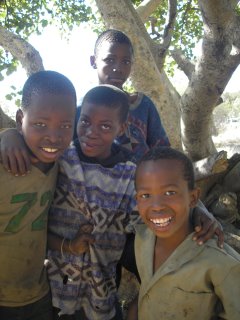 Maps of Gaborone, Botswana, list the neighborhood’s name Old Naledi. Most residents of Botswana, however, know it as zola –Setswana word meaning “no rules.” According to legend, bureaucrats gave poor Batswana families plot numbers, then allowed them to set up their houses wherever they liked within the district, one by one. As a result, house number 100-46 is equally likely to be adjacent to 711-83 as to 100-47. No one has ever seriously considered naming – much less mapping – the labyrinth of dirt paths that run between the cinderblock and tin-roof houses. Police presence is minimal. Children and adults alike follow the one Big Rule: he who is bigger makes the rules.
Maps of Gaborone, Botswana, list the neighborhood’s name Old Naledi. Most residents of Botswana, however, know it as zola –Setswana word meaning “no rules.” According to legend, bureaucrats gave poor Batswana families plot numbers, then allowed them to set up their houses wherever they liked within the district, one by one. As a result, house number 100-46 is equally likely to be adjacent to 711-83 as to 100-47. No one has ever seriously considered naming – much less mapping – the labyrinth of dirt paths that run between the cinderblock and tin-roof houses. Police presence is minimal. Children and adults alike follow the one Big Rule: he who is bigger makes the rules. But for all its faults, Old Naledi is not Haiti’s Cite Soliel or the slums of São Paolo, Brasil. First, the Batswana have an intense distaste for violence. Second, the Botswana government’s well-managed diamond wealth underwrites running water, sewerage, and basic health care, including ARVs for people living with HIV/AIDS.
As a result, the Old Naledi youth and children that Holy Cross Hospice serves are hungry, but not malnourished like other parts of Africa. The oung men struggle to find jobs, but do not group off into gangs. All the children are “handfuls,” but few are beyond control. They come from basic homes, but not constructed out of cardboard and scrap metal like in La Chureca in Nicaragua, where I spent last summer. And if their situation has filled them with anger, it has not depleted them of hope.

No comments:
Post a Comment